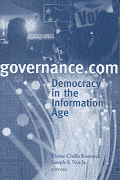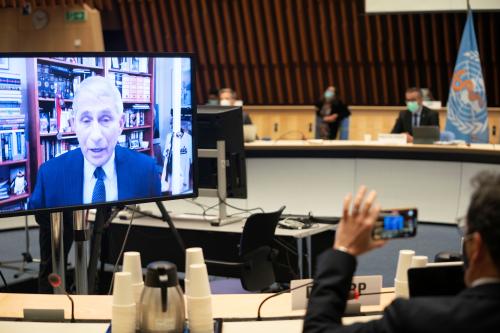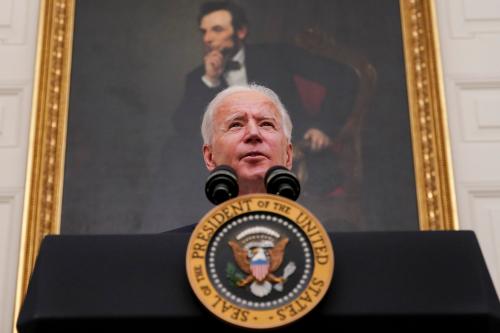Strengthening democracy abroad is a priority for the Biden administration, evident in its commitment to hold a “summit of democracies” to galvanize support for fighting corruption, combating authoritarianism, and advancing human rights. The president has also elevated the issue within his National Security Council staff by creating a high-level coordinator for democracy and human rights. As it crafts its broader democracy agenda, the administration will identify priorities, metrics to assess progress, and guiding principles that inform how it will use available tools to accomplish objectives.
One such guiding principle should be bolstering the “resilience” of democratic systems — that is, helping to make them better able to effectively deal with, recover from, and innovate following domestic and foreign challenges. Domestic challenges can include violence around contested elections, attempted coups or insurrections, and incumbent abuses of power. External challenges can include global economic crises, pandemics, or foreign attempts to influence a country’s political system.
As we have seen with COVID-19, democracies must do more than channel citizens’ views into policy. They must also have the capacity to deal with and adapt in the face of fundamental challenges — from within and outside their borders — while also fulfilling basic functions of representation. This staying power increases the durability of democracy and makes it a more attractive governing model than authoritarianism.
No matter the Biden administration’s democracy agenda priorities, more resilient political systems will be essential to accomplishing them. The same goes for governance focused on delivering for citizens. There are four key ways the Biden administration can help make developing and even some established democracies more resilient to the internal and external challenges they face.
Challenges to democracy: Foreign and domestic
Because democratic processes determine who has power, domestic and foreign actors attempt to manipulate political systems to their advantage.
Domestic challenges to democracy emanate from within and outside government. Elites abuse power to reduce accountability mechanisms and enable corruption that weakens democratic institutions. Incumbents pressure electoral authorities, employ disinformation, and intimidate opposition candidates to maximize their electoral advantage. During transitions, whether from authoritarianism or conflict, elites exclude groups from key decisions and processes, thereby eroding public trust in political processes and exacerbating polarization.
Foreign challenges can aggravate these domestic ones and present new stresses. Exogenous shocks like pandemics, global economic crises, and migration flows can strain governing capacity and create opportunities for autocrats to consolidate power, as we have seen with executives abusing authority during COVID-19.
Chinese and Russian malign influence is subverting democratic practice globally. The Chinese Communist Party (CCP) is interfering in vulnerable democracies, exploiting governance gaps to achieve its strategic aims. Beijing’s influence efforts bolster illiberal actors, undermine civil society and independent media, and render countries economically dependent on China. Russia’s assault on democratic institutions — including attacks on elections, fueling corruption abroad, and disinformation campaigns — aims to weaken open societies and diminish American leadership.
If deployed with intentionality, digital technology can help advance democracy by creating more accessible avenues for engagement with citizens, facilitating volunteer or civil society efforts to improve public services, and — through open data initiatives — increasing transparency and accountability. However, digitization also increases the surface area for information and cyber threats from foreign and domestic actors, and can exacerbate existing socio-economic inequities due to unequal access to digital infrastructure or online hate speech.
Modern democracies need to be equipped to deal with and adapt to such internal and external stresses while delivering for and representing citizens. Democracies that are better able to cope with these challenges are more capable of producing for their people. This helps maintain support for democratic governance, with associated positive impacts for stability and prospects for economic partnership.
How to make political systems more resilient
To make democracies more resilient to domestic and foreign challenges, the Biden administration can do four things.
First, the U.S. should make protecting and supporting democracy abroad a central U.S. interest that directly influences policy and strategy for other functional issues — from combatting global fragility and forging regional trade policy to collaborating with allies to devise a more open and transparent digital domain.
In these and other policy realms, unintended but often predictable consequences of policy decisions can affect countries’ resilience to internal and external challenges. In trade and investment policy Washington should, in conjunction with democratic allies, prioritize efforts that bolster growth in key countries — while reinforcing principles of openness and transparency — and offer alternatives to growing economic dependence on China that contributes to the corrosion of democratic institutions. The democracy lens should be paramount as the United States works with allies to create an internet governance framework that addresses the harms caused by the current lack of regulation, while presenting a free, open alternative to digital authoritarianism. In all policy domains, the United States must work with bilateral partners and through multilateral fora to address potential threats to democracy as the truly global challenge it is.
Second, the administration should continue the U.S. focus on strengthening the core institutions, practices, and norms that enable a society to respond and adapt to the spectrum of domestic and foreign threats. Strong democratic institutions with established accountability mechanisms are the most formidable line of defense against threats both domestic and foreign, whether from elite attempts to erode civic freedoms or foreign countries exerting malign influence.
However, the United States must update assistance programming to account for new stressors that partners face — whether from potential digitization or future pandemics. This should include moving quickly to fund, test, and scale up tools to prevent or mitigate today’s most pressing challenges. Training curricula, approaches to supporting advocacy campaigns, and election observation methodologies must not remain stagnant. Already, the U.S. government has helped develop proven toolkits to help prevent violence around contentious elections, enable local governments to deal with inflows of migration, forecast potential democratic backsliding events, and counter corruption. But more work is necessary to strengthen recipients to other emerging challenges. The need is particularly pronounced in the digital realm. With 40% of the world not yet online, the U.S. must devise ways to support partners to put in place the regulatory, governance, and civic architecture required to ensure digitization is inclusive, resilient to malign actors, and moves the world in the direction of a free, open, and global internet.
Third, the U.S. should dedicate greater effort to helping governments and civil society better detect, expose, and counter foreign authoritarian influence, whether from China or Russia. In many vulnerable countries there is limited understanding of the often-covert tactics the CCP or Kremlin employ to coerce, corrupt, and manipulate a range of actors to advance their strategic interests. Such understanding is critical to inoculating countries against the corrosion of their democratic institutions at a time when Beijing and Moscow are simultaneously popularizing authoritarianism through aggressive information operations and the export of digital surveillance and monitoring tools.
Finally, the Biden administration must focus on creating and implementing a positive vision of the future of democracy, one that embraces digital technology to advance democratic principles and global cooperation. The administration should focus on entrenching those ways in which digital technology can advance democratic participation: mandating open data, setting norms around public consultation for policy development, and creating and investing in participatory online deliberative democratic frameworks. Doing so will help make political systems more resilient.
Looking ahead
As President Biden said on January 20: “Democracy has prevailed.” For democracy to succeed abroad and his administration’s agenda with it, the United States should shore up countries’ resilience to challenges both foreign and domestic. But as the president rightly notes, the United States must also lead by example. This will mean expeditiously moving to repair America’s democratic institutions and citizens’ trust in them.









Commentary
Why supporting resilient political systems is key to a successful Biden democracy agenda
January 26, 2021